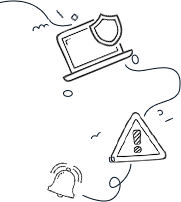Introduction
Your phone buzzes… then again… and again. It’s like a puppy begging for attention, but instead of a cute face, it’s a string of login requests—you’d swear it learned this trick from your toddler! That’s exactly what hackers want!
This sneaky tactic is known as MFA fatigue, and it’s becoming the newest trend in the hacker world, even causing security experts to mutter, “I can’t even!” Attacks like these bypass multi-factor authentication (MFA) without ever bothering to thieve your second factor.
With around 400K MFA fatigue attacks every year, you might wonder how this plot rolls out, and more importantly, what you can do to fend off these digital gremlins.
How Does MFA Fatigue Happen?
Hackers don’t need to figure out your MFA like it’s a puzzle in an escape room; they simply count on your patience running out. First, they steal your credentials—thanks to data breaches and your questionable choices of passwords (like “password123!”). Next, they bombard your device with push notifications, hoping you confuse it for a tech glitch, while it’s really a threat actor trying to sneak past you like a cat in the night!
So, why do people fall for these clever scams? Maybe you’ve had a long day, or it’s late, and you’re half asleep. You might just tap “Approve” faster than you’d grab a Taylor Swift concert ticket, only to find yourself the star of a cybersecurity horror story! Because, spoiler alert—it only takes one slip-up for an MFA fatigue attack to shine its wicked light.
Practicing vigilance and caution is key! Never approve a login request just to make the notifications stop, because trust me, that’s a giant blinking neon sign saying someone is knocking (and not the friendly neighbor).
What Happens After MFA Fatigue?
Why do these attacks work better than a surprise math quiz? Once an attacker gains access, they don’t waste time—they can…
- Steal data and leave you locked out of your accounts.
- Reset MFA settings, allowing them to log in whenever they fancy.
- Use your access to launch even more mayhem, like tricking your coworkers into approving their requests too.
The swiftness of attackers makes MFA fatigue a serious threat. What starts as a minor breach can spiral into a full-scale security crisis—a bit like leaving the cake out in the rain, but worse. We’re talking about potential repercussions for not just you, but the entire organization!
Real-World Implications of MFA Fatigue
Picture this: You’re a manager at a mid-sized company. It’s 11 PM and you’re just about to cuddle up for bed when your phone sounds like a popcorn popper on a sugar high. You’re tired, and without a second thought, you approve a login request, sealing your own fate. The next morning, you discover that sensitive company data has vanished into the void, and your account has been used to send love letters—uh, phishing emails—to your colleagues. The fallout? Immediate and severe! Clients will stop trusting you faster than a magician’s rabbit disappearing, leaving your company with serious financial and reputational damage.
So, how do you dodge these MFA fatigue attacks? Here’s your secret playbook:
- Never approve an MFA request you didn’t expect. If it appears out of the blue, treat it like a stranger asking for your Wi-Fi password—just don’t do it!
- Use number-matching MFA instead of simple push approvals. This method requires you to enter a code. You know what they say—making hackers work harder might just keep them away!
- If you’re bombarded with requests, report it immediately. You might have a compromise on your hands faster than you can say “malicious intent.” Quick reporting can mitigate damage and signal to your IT department that it’s time to spring into action!
- Educate and train employees. Regular training on cybersecurity best practices will prepare your crew to recognize and respond to MFA fatigue attacks. Awareness is the first line of defense—like a superhero cape for your security!
- Implement additional security measures. Think about using biometric authentication or authentication apps. These methods are the Fort Knox of multi-factor authentication, making it even tougher for traps like MFA fatigue to catch you off guard!
Knowledge and awareness are our best defense against MFA fatigue and other cyber threats lurking in the shadows!
Conclusion
Multi-factor authentication is your reliable sidekick meant to keep hackers at bay, but it only works if you’re the one in control. Don’t let bad actors wear you down. By being aware of the tactics used in MFA fatigue attacks and implementing strong security measures, you can protect both yourself and your organization from this growing menace.
Remember, cybersecurity is a team sport, and staying vigilant is your key to maintaining a secure digital environment. So keep your wits about you, and may the force (of security) be with you!
The post How MFA Fatigue Hurts Your Accounts appeared first on .




